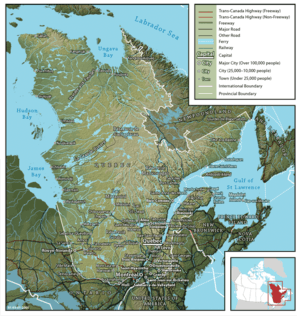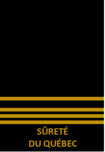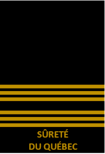Sûreté du Québec
| Sûreté du Québec | |
|---|---|
| Abbreviation | SQ |
|
Coat of Arms granted by the Canadian Heraldic Authority | |
|
Badge of the Sûreté du Québec | |
|
Flag of the Sûreté du Québec | |
| Motto |
Service, Intégrité, Justice Service, Integrity, Justice |
| Agency overview | |
| Formed | May 1, 1870 |
| Legal personality | Governmental: Government agency |
| Jurisdictional structure | |
| Operations jurisdiction* | Province of Quebec, Canada |
 | |
| Map of Sûreté du Québec's jurisdiction. | |
| Size | 1,542,056 km2 |
| Population | 7,651,531 |
| General nature |
|
| Operational structure | |
| Overviewed by | The Queen in Right of Quebec |
| Headquarters | Montreal |
| Officers | 5,269[1] |
| Elected officer responsible | Martin Coiteux, Ministre de la Sécurité publique |
| Agency executive | Martin Prud’homme, Directeur Général |
| Districts | 10 |
| Website | |
| http://www.sq.gouv.qc.ca | |
| Footnotes | |
| * Divisional agency: Division of the country, over which the agency has usual operational jurisdiction. | |
Sûreté du Québec (French: [syʁte dy kebɛk], Quebec Safety), abbreviated SQ, is the provincial police force for the Canadian province of Quebec.[2] No official English name exists[nb 1], but Quebec Provincial Police is a common translation. The headquarters of the Sûreté du Québec are located on Parthenais street in Montreal and the force employs roughly 5,200 officers. SQ is the second largest provincial force (behind the Ontario Provincial Police) and fourth largest force in Canada (behind the Toronto Police Service, Ontario Provincial Police, and the Royal Canadian Mounted Police).
The primary function of the Sûreté du Québec is to enforce provincial laws, some municipal bylaws, the Criminal Code, and many other laws throughout Quebec and to assist municipal police forces when needed. Members of the force can also legally act as forest conservation agents for example. The Sûreté du Québec is also responsible for providing municipal police services to municipalities in the province that do not otherwise have municipal or regional police services. Currently that includes municipalities with under 50,000 people. As such, the force is mainly present in small rural and suburban areas. The force also patrols provincial highways. In addition, the Sûreté du Québec can investigate any incident that involves wrongdoing by a municipal police force or a case where a police intervention caused death.
In the early 2000s, the force absorbed many smaller police services (e.g., Drummondville and Saint-Hyacinthe).
History
On February 1, 1870, the Quebec provincial government created the Police provinciale du Québec[5] under the direction of its first commissioner, Judge Pierre-Antoine Doucet. This new force took over the headquarters of the Quebec City municipal police, which were then disbanded, although the city relaunched a municipal force in 1877.
In 1900, two distinct provincial police forces were created: the Office of Provincial Detectives of Montreal, in response to a crime wave in that city, and the Revenue Police, whose mission was to collect taxes. In 1902, the government decided that the provincial police should no longer be directed by a judge but by an officer of the police themselves. Augustin McCarthy was chosen as the first chief drawn from the ranks of the police.
In 1922, two headquarters were established, one in Quebec City, headed by McCarthy, and one in Montreal, headed by Dieudonné Daniel Lorrain. The Office of Provincial Detectives of Montreal became part of the general provincial police in that year. The Quebec division included 35 police officers and two detectives.
In 1925, police officers started patrolling on motorcycles. In 1929 and 1930, the structure of the force was reformed and the agency adopted a new name as Sûreté provinciale du Québec which was later shortened to its present name.[6]
Montebello incident
The Sûreté du Québec admitted in August 2007 that they had used undercover police posing as protestors at the 2007 Montebello Security and Prosperity Partnership of North America meetings. This admission was made after a video captured by protestors was widely circulated in the Canadian media and made available on YouTube.[7] It is not uncommon to make use of undercover agents at protests of this kind, but the video was especially controversial because it appeared to show one of the officers carrying a rock, suggesting to some viewers that the police may have been acting as agents provocateurs by inciting violence.
Licence Plate Recognition System
The Sûreté du Québec has been using the LPRS systems since 2009. The objective of the LPRS is to make the streets and highways safer by removing vehicles not authorized to be on the road. The hotlist plate database can consist of the following types:
- unregistered plate (not paid at DMV/SAAQ)
- Stolen vehicle
- AMBER Alert
- Wanted Vehicle
The LPRS are installed on 10 Sûreté du Québec vehicles. The LPRS integrator is Gtechna. Gtechna is primarily a citations issuance and management software developer which integrates mission critical technologies such as Licence Plate Recognition (LPR) to streamline the enforcement of moving and parking violations.
Chiefs and Directors-general
- Pierre-Antoine Doucet (1870–1877)
- Jean-Baptiste Amyot (1877–1878)
- Alexandre Chauveau (1880–1899)
- Augustin McCarthy (1902–1932)
- Dieudonné Daniel Lorrain (1922–1928)
- Maurice-Charles Lalonde (1929–1936)
- Philippe Aubé (1936–1937)
- Philippe-Auguste Piuze (1937–1940)
- Marcel Gaboury (1940–1944)
- Joseph-Paul Lamarche (1944–1950)
- Hilaire Beauregard (1954–1960)
- Josaphat Brunet (1960–1965)
- J. Adrien Robert (1965–1968)
- Maurice St-Pierre (1969–1973)
- Paul-A. Benoît (1973–1974)
- Jacques Beaudoin (1974–1988)
- Robert Lavigne (1988–1995)
- Serge Barbeau (1995–1996)
- Guy Coulombe (1996–1998)
- Florent Gagné (1998–2003)
- Normand Proulx (2004–June 30, 2008)
- Richard Deschesnes (July 1, 2008–2012)
- Mario Laprise (2012-2014)
- Luc Fillion INT.(2014)
- Martin Prud'Homme (2014- )
Districts
- Bas-Saint-Laurent-Gaspésie-Îles-de-la-Madeleine
- Saguenay-Lac-Saint-Jean
- Capitale-Nationale-Chaudière-Appalaches
- Mauricie-Centre-du-Québec
- Estrie
- Montréal-Laval-Laurentides-Lanaudière
- Outaouais
- Abitibi-Témiscamingue-Nord-du-Québec
- Côte-Nord
- Montérégie
Rank badges
Rank insignia of the Sûreté du Québec are on contained on "slip on" sleeves worn on the epaulettes of uniform jacket or shirt shoulders.
Constables do not have any insignia on their uniform.
The rank insignia:
| Rank | Sergeant | Lieutenant | Captain | Inspector |
|---|---|---|---|---|
| Insignia |  |
 |
 |
 |
| Rank | Chief Inspector | Deputy Director | Director General of the SQ | |
| Insignia |  |
 |
 |
Uniforms
Early uniforms were British in origins including the use of the Custodian helmet, with the Kepi later added as well.[8] The force adopted a uniform with a more distinct green tone, as well as a peaked cap, in the 1960s.[9]
The emblem of the force changed in the 1970s when the old provincial coat of arms gave way to the fleur-de-lis.
In late 2016, Martin Prud'Homme, Director General of the SQ, announced the uniforms would be changed. Shirts would become olive green, the patches black, the pants blue-black, and the bulletproof vests would become black.
Fleet



Cars:
- Ford Taurus
- Chevrolet Impala
- Chevrolet Tahoe
- Dodge Charger
- Ford Crown Victoria Police Interceptor - retired
- Chevrolet Caprice - retired
- Plymouth Fury - retired
- Chevrolet Bel Air - retired
- Ford LTD (North America) - retired
Trucks:
- Dodge Dakota
- Ford E-250
- Ford F-350
- Ford F-450
- Dodge Ram 2500 pickup
- Chevrolet Tahoe
Motorcycles:
- BMW Police Motorcycle
- Mikado bicycles
Special Vehicles:
- Prevost Car Command Post
- Hummer H1 Armoured Truck
- International 7500 support vehicle
- APC
- Cambli International Thunder 1 ARV (with International 7500 chassis)[10]
Air:
Sea:
- Doral Patrol Boat
- Bombardier Sea-doo
Wild:
- Bombardier Ski-doo Snowmobile
- Grizzly ATV
Miscellaneous:
Equipment
The standard-issue weapon of Sûreté du Québec is the Glock pistol loaded in 9×19mm Parabellum caliber. Various models are adopted such as the standard Glock 17, compact Glock 19 and sub-compact Glock 26. Tactical officers used CQB Close Quarter Battle combat rifle—variant of Colt Canada C8 rifle.
See also
- Service de police de la Ville de Montréal
- State police
- Ontario Provincial Police
- Royal Newfoundland Constabulary
- Newfoundland Rangers
- Royal Canadian Mounted Police
Notes
- ↑ Being a minority, Quebec English speakers frequently use common or official French language terms instead of the more recognised English terms of North-American English. see Quebec English,[3][4]
References
- ↑ "Effectifs et ressources - Police nationale - Sûreté du Québec". Sq.gouv.qc.ca. Retrieved 2012-08-14.
- ↑ The Sûreté du Québec on the official website describes the force as a "national police force". "As a national police force providing services to citizens, other police organizations and the State, the Sûreté du Québec is also a leader in..."
- ↑ "QPP - Quebec Provincial Police". Acronymfinder.com. 1990-07-11. Retrieved 2012-08-14.
- ↑ "Quebec police admit they went undercover at Montebello protest - Canada - CBC News". Cbc.ca. 2007-08-23. Retrieved 2012-08-14.
- ↑ "1870 Les débuts de la Sûreté du Québec - Police - Sûreté du Québec". Sq.gouv.qc.ca. Retrieved 2012-08-14.
- ↑ "1920-1929 Création de services spécialisés - Police - Sûreté du Québec". Sq.gouv.qc.ca. 2008-10-22. Retrieved 2017-01-30.
- ↑ "police accused of attempting to incite violence at spp". YouTube. 2007-08-22. Retrieved 2012-08-14.
- ↑ "1878 La police après 1878 - Police nationale - Sûreté du Québec". Sq.gouv.qc.ca. 2008-10-22. Retrieved 2017-01-30.
- ↑ "1963-1967 Identification visuelle et modernisation - Police nationale - Sûreté du Québec". Sq.gouv.qc.ca. 2008-10-22. Retrieved 2017-01-30.
- ↑
External links
| Look up sûreté du québec in Wiktionary, the free dictionary. |
![]() Media related to Sûreté du Québec at Wikimedia Commons
Media related to Sûreté du Québec at Wikimedia Commons
![]() News related to Five arrested in Canada after C$2 million armoured car robbery at Wikinews
News related to Five arrested in Canada after C$2 million armoured car robbery at Wikinews


